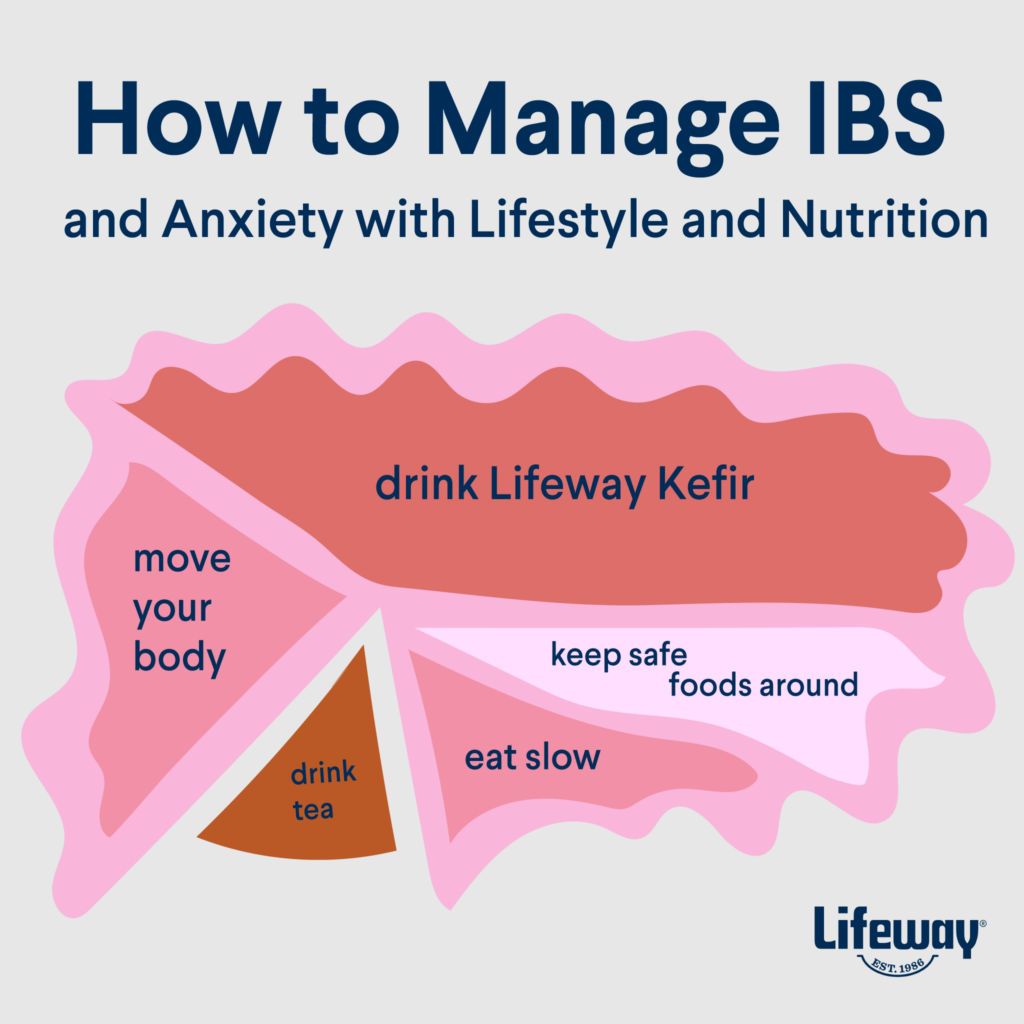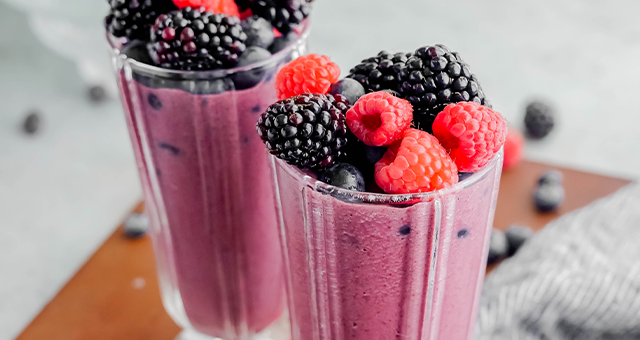
April is Irritable Bowel Syndrome (IBS) Awareness Month, a month dedicated to IBS diagnosis, treatment and overall improvement in quality of life. IBS is a functional disorder of the gut where the gastrointestinal system does not function as it should. It is not curable, making dealing with IBS management a lifelong issue. For people with IBS, food doesn’t digest the same as it does for others, and it doesn’t process the same once digested. This may be caused by erratic nerve transmissions within the gut, improper immune function, changes in gut bacteria, and/or abnormalities in gut motility.
IBS affects people’s everyday lives for those who have it, day in and day out. This alone creates extreme stress and anxiety, and it can even affect a person’s social life and work schedule on bad days. Most people deal with extremes when it comes to IBS. Gut movements are too slow or too fast which causes extreme pain, gas, bloating, constipation, diarrhea, or alternating constipation and diarrhea. Even eating can seem like a chore and create stress for people with IBS because when they eat, many times they get sick. However, all is not lost. With helpful lifestyle tips that are practiced consistently, patients can experience relief and manage symptoms.
How to Manage IBS Symptoms and Anxiety with Lifestyle and Nutrition

Committing to a healthy lifestyle and symptom management can assist with the reduction of flare-ups. Prevention, preparation, and self-care are key. Those that have IBS or someone you know with IBS may benefit from the following tips. Taking care of your gut can do wonders for your health!
1. Preparation is Key
We know there is a strong connection between the gut and the brain (known as the gut-brain axis), and the gut can react under stress causing IBS symptoms to flare. For this reason, preparation is the number one thing to remember when living with IBS. Most people have more issues in the morning than any other time of day, which can be caused by slow digestion from the previous night, or by the stress of hectic morning schedules. Think about how you would prepare yourself for the first day of a new job and take those same steps on a daily basis if you have IBS. For example, eat a dinner you know will digest well for you the night before a workday, lay out your clothes the night before, and even take a day on the weekend to prepare meals that are safe for you to eat so you have as little to worry about each morning as much as possible. These steps can help set you up for less stress and success.

2. Safe Foods: Know Your Fiber, Fats, and Fermented Foods
Over time, those with IBS learn, for the most part, which foods upset their system and which ones don’t. However, there are specific foods, nutrients or categories that you may need to pay closer attention to or which have different benefits. Below are some useful tips surrounding three of these categories: fiber, fats, and fermented foods.
Fiber:
Fiber is essential to IBS management as it offers a wealth of benefits to our digestion and is important for a healthy gut. There are two types of fiber, insoluble and soluble, that make up all plant foods including fruits, vegetables, whole grains, beans, nuts and seeds. While fiber tolerance can vary between individuals, knowing the difference between the two and incorporating into your IBS plan can help in management of symptoms.
Soluble fiber refers to fiber that is soluble in water. It soaks up like a sponge once digested and forms a gel, which creates a slower, smooth digestion process and may lead to fewer spasms. People with IBS, often find that foods higher in soluble fiber will work better for them than a diet high in insoluble fiber. Foods such as brown rice, oatmeal, pumpkin/squash, potatoes, oranges, carrots, zucchini, cantaloupe, kiwis, papaya, and bananas are just some examples of foods higher in soluble fiber, rather than insoluble fiber.
Insoluble fiber does not dissolve in water, and moves through the digestive tract without breaking down. This causes swifter movement of digestion, which can help with constipation but may lead to spasms that create pain in those with IBS if too much is eaten in one sitting. Insoluble fiber is very important to our digestion, but creating meals with a soluble fiber base can better help in the management of IBS symptoms. Examples of foods higher in insoluble fiber include bran, nuts, seeds, blackberries, raspberries, corn, and legumes. Skins and stalks of many fruits and vegetables are also high in insoluble fiber.
Soluble fiber foods can easily be worked into meals. Instead of a bowl of bran cereal made with blackberries and seeds, make some oatmeal with some chopped banana, a few blueberries, and a smaller amount of ground flax or chia seeds. Ground seeds may work better for sensitive stomachs due to less work being required by the digestive system. A great dinner idea is a hearty sweet potato stew over brown rice with some zucchini, carrot, and green beans. Work small amounts of lean proteins in, whether that be fish, chicken, or if you’re plant-based, try small amounts of split lentils in for insoluble fiber, which digests a little easier for people with IBS than large beans. Foods like spinach, fennel, and romaine lettuces also work well for people versus higher amounts of cruciferous veggies that can lead to more gas and bloating (broccoli is one example). Cooking foods can also make foods easier to digest than eating high amounts of raw foods.
Fats:
Everyone needs healthy fats, so you should not eat a fat-free diet, but eating higher-fat meals often causes more IBS symptoms for a variety of reasons, mainly because fats sit longer in our digestive tracts and because they can cause spams in sensitive individuals. This can lead to more gas, bloating, and for some, constipation as transit times slows.
Working small amounts of healthy fats into high-soluble fiber meals will help dramatically if you find yourself in the middle of an IBS flare-up. Fried foods, or consuming higher fat foods in large amounts at one sitting (avocados, coconut, high-fat meats, etc) are often ones that can trigger symptoms. Foods with healthy fats include flax meal, up to 2 tablespoons of chia or hemp seeds, eggs, 1/4 an avocado instead of a whole one, and 1 teaspoon oil per serving instead of several tablespoons. Experiment with these tips and see which ones work for you since we are all unique with our digestion needs.
Fermented Foods:
Research is finding that feeding our gut microbiome with probiotics found in Lifeway Kefir helps maintain balance in the gut microbiome, reducing the risk of gastrointestinal disorders such as inflammatory bowel disease, colitis, irritable bowel syndrome, and colitis. Fermented foods may help lower inflammation in the gut, reduce digestive upset and aide in our overall immune system. There are a wide variety of fermented foods that may help alleviate IBS symptoms while also getting probiotics into your diet. Some probiotic fermented foods to work into your day include kimchi, sauerkraut, miso, and cultured dairy products such yogurt, Lifeway Kefir and Farmer Cheese. Many times, those with IBS cannot tolerate lactose in dairy, so those that are low in lactose (or lactose-free), like Lifeway Kefir and Farmer Cheese, are best compared to traditional dairy products. Lifeway Kefir contains 12 live and active cultures and 25-30 billion units of colony forming units, more than double that in yogurt, and it’s up to 99% lactose-free.

3. Take time to Eat and Digest Meals
Sometimes just as important as what you eat is how you eat. Many with IBS find eating smaller portions throughout the day easier so that digestion patterns are more normal instead of missing and skipping meals. Take time to eat and digest your food. If you work somewhere out of the house or in the house and the weather is nice, eat outside when you can. Nature is naturally calming on nice days and can create a calmer eating environment than trying to eat on the run, in a noisy environment, or in a hurry. If you don’t have to take a lot of time to prepare your meals and snacks throughout the week, you can simply grab and go, giving you more time to actually eat and digest them.
4. Move Your Body and Get Enough Sleep
Moving your body is also key for IBS management. Exercise not only can reduce stress and psychological symptoms, but it also helps regulate digestive system as well. It has the ability to help move food through the digestive tract, as well as calm the gut to reduce pain. Another added benefit of exercise is that it can help benefit our sleep cycle, also important in the management of IBS. There is a connection between our gut health, stress and our circadian rhythm, and IBS symptoms are almost always worse for people when they don’t get enough sleep. You’ll likely notice on days you get enough rest, eat well, and move your body, symptoms are much less often than when you don’t do these things.
There’s no need for high-stress workouts, simply walking and yoga will be perfect for people with IBS. A 30-minute light walk each day will do wonders for stress management and IBS symptoms. And, yoga can help create a sense of calm to help produce more normal patterns in the gut.
5. Incorporate Helpful Teas Low in Acid and Caffeine
Acid and caffeine in some coffees and teas can also be problematic for those with IBS. If you love coffee, look for low-acid varieties, and try mixing half caffeinated and half decaffeinated. Herbal teas and green teas are also perfect choices that are easy to digest versus some black teas. Some teas have a calming effect help manage gas and bloating, common symptoms with IBS. These include herbal teas such as chamomile, lavender (at night), peppermint, fennel, ginger, and lemon balm. Green teas are a good choice if you want a small dose of caffeine in a more gentle way as well. If you can’t tolerate caffeine, choose decaf green instead.

The last thing to remember is that if you have IBS, you are not alone. Many people with IBS can find help from other people, so be open to finding support groups online, or websites that offer a community for assistance. Of course, always reach out to your doctor and dietitian for management for IBS concerns or diagnosis.
Be sure to check out all our recipes here at Lifeway and our blog for more lifestyle management tips.